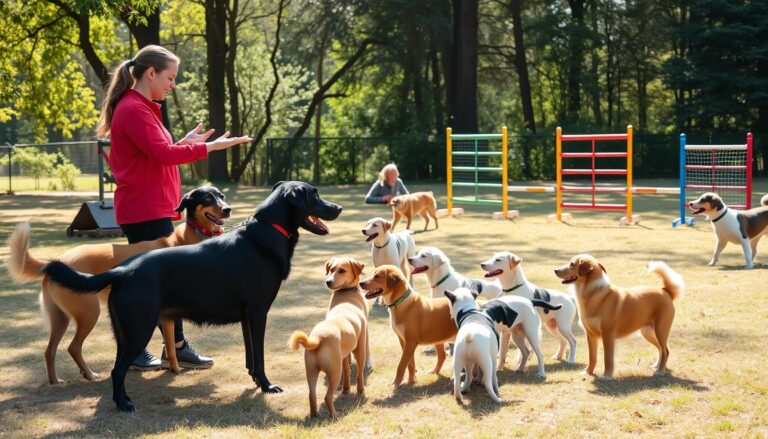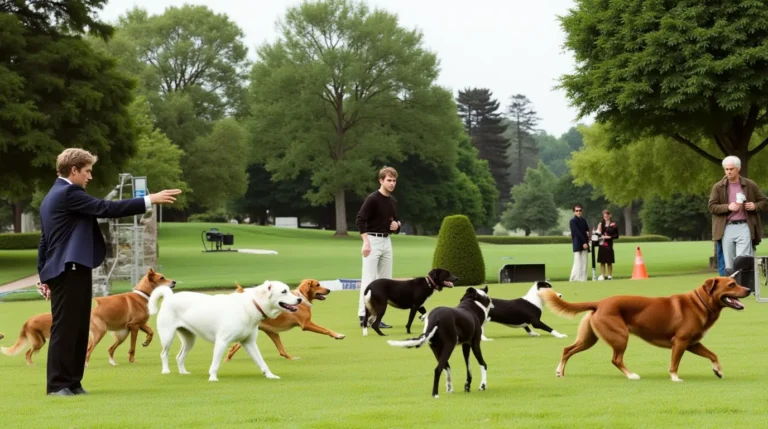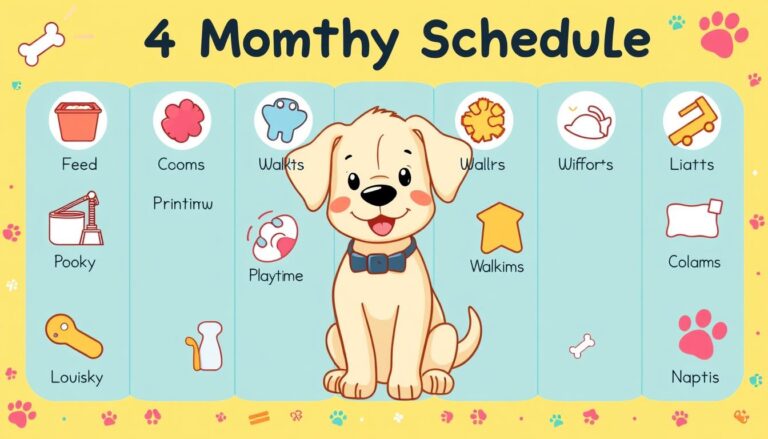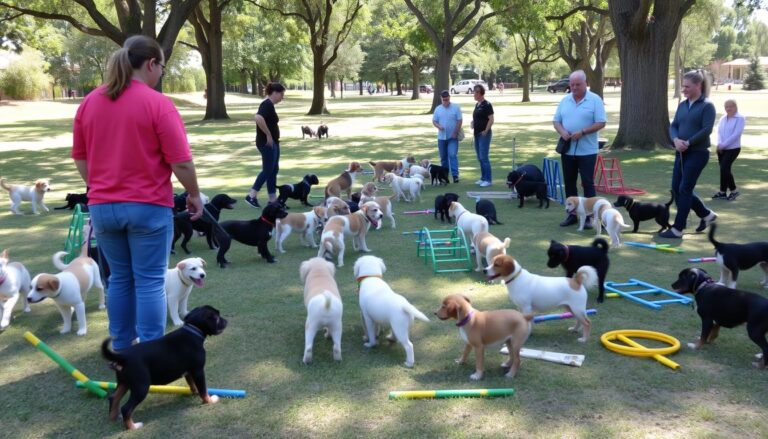Dog Trainers Near Me: Find the Best Puppy Training Classes Nearby
Dog Trainers Near Me: Find the Best Puppy Training Classes Nearby
As a proud pet parent, you want your furry friend to be well-behaved and obedient. Training a puppy can be tough, needing patience and expert help. Lucky for you, skilled dog trainers in your area are ready to assist.
Picture your puppy responding to commands and walking calmly by your side. With the right training, you can unlock your dog’s full potential. This will strengthen your bond and last a lifetime. Whether you’re new to dog ownership or have experience, finding the best puppy training classes nearby is crucial.

- Dog Trainers Near Me: Find the Best Puppy Training Classes Nearby
- Understanding Professional Dog Training Services
- How to Search for Dog Trainers Near Me
- Benefits of Local Puppy Training Classes
- What to Expect in Professional Dog Training Sessions
- Comparing Dog Training Costs and Programs
- Essential Questions to Ask Potential Dog Trainers
- Popular Training Techniques and Methodologies
- Preparing Your Puppy for Training Classes
- Warning Signs to Look For When Selecting a Dog Trainer
- Conclusion
- FAQ
- What are the benefits of enrolling your puppy in professional training classes?
- How do I find qualified dog trainers near me?
- What should I expect during professional dog training sessions?
- How much do dog training services typically cost?
- What are some common training techniques used by professional dog trainers?
- How can I prepare my puppy for their first training class?
- What are some red flags to watch out for when choosing a dog trainer?
Understanding Professional Dog Training Services
Professional dog training services offer great help for your dog’s training. They have group and private lessons. Each one is designed for your dog’s needs and your goals.
Group vs Private Training Sessions
Group classes help your dog meet other dogs and learn together. They teach basic commands and positive training. Private lessons give your dog personal attention and focus on specific issues.
Certification and Qualifications to Look For
Choosing a dog trainer means looking for the right certifications. Trainers with CPDT or IAABC certifications are well-trained. They use professional dog training methods and care about your dog’s well-being.
Training Methods and Approaches
Certified dog trainers use positive reinforcement to teach your dog. This method rewards good behavior and is very effective. Some trainers use clicker training or special strategies for specific problems.
The main goal of dog training is to strengthen your bond with your dog. It teaches important skills and builds confidence. Knowing your options helps you choose the best training for your dog.
How to Search for Dog Trainers Near Me
Finding good dog trainers near you is key for your dog’s growth. There are many ways to find top local puppy training options.
Start by searching online for phrases like “dog training near me“ or “find dog trainers.” This will give you a list of nearby trainers, their services, and reviews. Look at the trainers’ qualifications, methods, and any special areas they focus on.
- Ask your vet for recommendations. They know the local pet scene well and can suggest trusted dog trainers.
- Visit your local pet stores or groomers. They might know of good dog training near me places.
- Talk to friends, family, or neighbors who’ve trained their dogs. Their advice can be very helpful when looking for a dog trainer.
By using these methods, you’ll find the best local puppy training for your dog. This will help your dog become well-behaved and confident.
“The key to finding the best dog trainers near me is to do your research and ask plenty of questions. This will ensure you select a program that aligns with your pup’s needs and your training goals.”
Benefits of Local Puppy Training Classes
Putting your puppy in local training classes offers more than just basic obedience. These classes are great for your puppy’s growth and your bond with them. They provide valuable learning experiences.
Socialization Opportunities
Training classes are a safe place for your puppy to meet other dogs and people. This is a key time for social learning. It helps your puppy act right and feel confident.
Positive experiences with different things help your puppy grow into a friendly dog. This is crucial for their development.
Structured Learning Environment
Professional classes teach puppies important skills step by step. This method helps your puppy learn and remember better. It builds a solid base for future learning.
Group classes also help puppies learn fast. They see others doing the same things, which helps them understand better.
Expert Guidance and Support
Certified trainers lead these classes. They give you and your puppy valuable advice. They help with specific needs and how to keep learning at home.
Choosing local puppy training classes is a smart move. It helps your puppy behave well, socialize, and bond with you. The puppy training benefits, dog socialization, and structured training are worth it.
What to Expect in Professional Dog Training Sessions
Starting a dog training experience with your pup is exciting and rewarding. Whether you choose group classes or private dog training sessions, knowing what to expect is key. This helps you and your furry friend get the most out of the training expectations. Let’s explore the typical structure and activities in professional dog training.
In a group dog training class, you’ll see a blend of instructions, demonstrations, and practice. The trainer will begin with basic commands like sit, stay, and come. You and your pup will practice these in a supportive setting, with the trainer offering feedback and encouragement.
- Mastering foundational commands
- Socialization with other dogs and owners
- Troubleshooting common behavioral issues
Private dog training sessions focus on your specific needs and goals. You’ll discuss your pup’s personality, strengths, and areas for improvement. Then, the trainer will work with you one-on-one to tackle behavioral challenges, reinforce good habits, and teach specialized techniques.
“The key to a successful puppy training experience is consistency and patience. Stay committed to the program, and you’ll witness significant improvements in your furry friend’s behavior and obedience.”
Professional dog training sessions mix verbal instruction, hands-on practice, and positive reinforcement. The aim is to strengthen your bond, build essential skills, and enjoy a well-trained relationship.

Comparing Dog Training Costs and Programs
Dog training costs can vary a lot. It depends on the services you choose. Knowing the prices for different programs helps you make a smart choice and get good value.
Price Ranges for Different Services
Dog training prices start at $30 for group classes. Private training can cost up to $100 an hour. Prices change based on the trainer’s experience, location, and session length.
Package Deals and Class Bundles
Many trainers offer deals on packages or bundles. These can include group or private sessions. Buying a package often means paying less per session.
Investment Value Over Time
Though dog training costs may seem high at first, it’s worth it in the long run. Trained dogs are easier to handle and less likely to cause trouble. They also listen better to commands. This makes your life with your dog better and can save money on vet bills or behavioral issues.
“Investing in professional dog training is one of the best things you can do for your pet’s well-being and your own peace of mind.”
Essential Questions to Ask Potential Dog Trainers
When choosing dog trainers for your beloved pup, it’s crucial to ask the right questions. Asking the right trainer interview questions can help you find the best-suited trainers. This ensures a positive learning experience for both you and your dog.
Begin by asking about the trainer’s background and qualifications. Find out their training method, years of experience, and any special certifications. Knowing their approach is key to selecting trainers that fit your needs and your dog’s.
- What training techniques do you primarily use, and why?
- Can you provide references from past clients?
- Do you provide both group and private training sessions?
- How do you handle behavioral challenges, such as aggression or separation anxiety?
- What is your policy on cancellations and make-up classes?
- Can you create a personalized training plan for my dog’s specific needs?
Asking these essential questions will help you make an informed decision when choosing dog trainers. This ensures your pup gets the best care and training. A good trainer is patient, knowledgeable, and dedicated to your dog’s well-being and progress.
“The secret to effective dog training lies in finding a trainer who understands your dog’s needs and communicates clearly with you as the owner.”
Popular Training Techniques and Methodologies
Training your dog can be done in many effective ways. Two top methods are positive reinforcement and clicker training. Both are used by professional dog trainers.
Positive Reinforcement Training
Positive reinforcement training is kind and focuses on rewarding good behavior. You give your dog treats or praise when they do something right. This helps them learn fast and strengthens your bond.
It’s great for boosting confidence and teaching new tricks. It also helps reduce anxiety.
Clicker Training Basics
Clicker training uses a small device that makes a “click” sound. It marks the exact moment your dog does something right. Then, you reward them right away.
This method is excellent for teaching complex tricks. It’s a valuable tool in your dog training techniques collection.
Behavioral Modification Approaches
Trainers also use behavioral modification for specific issues. Techniques like desensitization and counterconditioning help with fears and anxieties. A certified trainer can create a plan tailored to your dog’s needs.
Success in training comes from being consistent, patient, and rewarding good behavior. With the right approach, your dog can become well-trained and confident.
Preparing Your Puppy for Training Classes
Starting your puppy’s training classes is an exciting journey. It’s crucial to prepare your pup well. This includes learning basic commands and social skills. Doing this groundwork is key to your puppy’s success in training.
Begin practicing basic commands at home. Teach your puppy to “sit,” “stay,” and “come” using positive methods. This makes your puppy more responsive in classes and builds trust.
Socialization is also vital. Expose your puppy to various people, animals, and environments in a positive and encouraging manner. This makes your puppy more confident and comfortable in group settings.
Make sure you have the right equipment for classes. You’ll need a good collar or harness, a leash, and treats or toys. Having the right gear helps your puppy stay focused and engaged.
By preparing your puppy well, you’re setting them up for success. With effort and patience, your puppy will become well-trained, social, and confident.

“The secret to a well-behaved puppy is starting training early and maintaining consistency. With the right preparation, your pup will be ready to thrive in their training classes.”
Warning Signs to Look For When Selecting a Dog Trainer
Finding the right dog trainer is crucial. You need to watch out for trainer red flags that show a trainer might not be good. It’s important to avoid bad trainers to make sure your dog gets the best care and training. Here are a few red flags to watch out for:
- Lack of Certification or Qualifications: Look for trainers with recognized certifications, like CPDT or IAABC.
- Use of Aversive Training Methods: Stay away from trainers who use punishment, like choke chains or shock collars. Positive reinforcement is better.
- Inadequate Experience: Ask about the trainer’s experience and how many dogs they’ve helped. New trainers might not know how to help your dog.
- Poor Communication and Responsiveness: A good trainer should answer your questions and be available to help throughout training.
By watching out for these trainer warning signs, you can avoid bad trainers. This way, your dog will get the quality training they need.
| Red Flag | Explanation |
|---|---|
| Lack of Certification | Look for trainers with recognized certifications, such as CPDT or IAABC, to ensure they have the necessary knowledge and skills. |
| Use of Aversive Methods | Avoid trainers who rely on punishment-based techniques, as positive reinforcement is the recommended approach for ethical and effective training. |
| Inexperience | Ask about the trainer’s background and the number of clients they have successfully worked with to ensure they have the necessary skills. |
| Poor Communication | A good trainer should be readily available to answer your questions and address any concerns throughout the training process. |
By being vigilant and identifying these trainer red flags, you can avoid the pitfalls of working with an unsuitable dog trainer and ensure your pup receives the high-quality, compassionate training they deserve.
Conclusion
The importance of professional dog training is huge. Finding the right trainer near you can unlock your dog’s full potential. Local puppy training classes offer many benefits for you and your dog.
When looking for a dog trainer, check their certification and qualifications. Ask important questions to find a reputable trainer. This investment will strengthen your bond and make your dog well-behaved and confident.
It’s never too late to start training your dog. The importance of dog training and finding the right trainer is key. With the right help, you and your dog can have a happy and harmonious life together.
FAQ
What are the benefits of enrolling your puppy in professional training classes?
Professional training classes offer many benefits. They provide socialization, a structured learning environment, and expert guidance. These classes help your puppy become well-behaved and obedient. They also strengthen the bond between you and your pet.
How do I find qualified dog trainers near me?
To find qualified dog trainers, start with online searches and ask your vet. Also, ask other pet owners for recommendations. Look for trainers with certifications, positive reviews, and experience in methods you prefer.
What should I expect during professional dog training sessions?
Professional dog training sessions mix group classes and one-on-one instruction. You and your pet will learn essential commands and social skills. Trainers will guide you, providing feedback and support.
How much do dog training services typically cost?
The cost of dog training varies based on location, trainer experience, and training type. Expect to pay $50 to $200 per session. Group classes are usually cheaper than private lessons.
What are some common training techniques used by professional dog trainers?
Professional trainers use positive reinforcement, clicker training, and behavioral modification. These methods reward good behavior and help shape the dog’s responses. They also address any issues that lead to bad behavior.
How can I prepare my puppy for their first training class?
To prepare your puppy, practice basic commands at home. Start with sit, stay, and come. Also, socialize your puppy by introducing them to new people, animals, and places. Make sure you have the right equipment, like a leash and treats, for the training sessions.
What are some red flags to watch out for when choosing a dog trainer?
Be cautious of trainers without certifications or who use aversive methods. Also, watch out for those who don’t address your concerns or have a one-size-fits-all approach. Be wary of trainers who won’t provide references or a detailed training plan.






